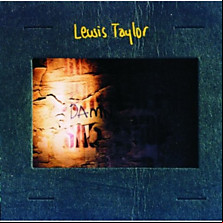BBC Review 1bj6o
The strange and beguiling debut from one of UK soul’s most fascinating artists.
Daryl Easlea 2012
Lewis Taylor’s 1996 debut album is strange and beguiling. Although it borrows heavily from a variety of genres, it stands very much alone in its own discrete, unusual universe.
Had Taylor been American, he would have surfed on the wave of neo-soul that was breaking at the time. But he wasn’t. Composed, produced and largely played alone, this eponymous effort sounds as if Shuggie Otis has been transplanted to Barnet, north London.
Taylor was a talented multi-instrumentalist with a taste in music way beyond his years. Happy discussing progressive rock in interviews, he’d actually played in a later incarnation of heavy blues/psych outfit, the Edgar Broughton Band. Signed to Island on the strength of a demo alone, Taylor was destined to be one of the classic artists unable to be pigeonholed.
With its one-word titles and intense, occasionally disquieting music, Lewis Taylor is a claustrophobic listen at times. On Track, he sings: “My mood is as black as the darkest cloud”. Lucky manages to distil the work of Marvin Gaye, Al Green and Bobby Womack into six-and-a-half languorous minutes.
Elsewhere, the soulful yet unsettling guitar figure on Bittersweet nods to trip hop, and the song takes comparisons with Gaye as far as possible. But unlike other homage pieces which could descend into pastiche, when the drums kick in around four minutes this track shows it’s no textbook parody of classic soul.
But Lewis Taylor became an album that everybody talked about but few bought; supposedly a soul record for people who didn’t like soul, ed by some stunning live performances.
Taylor recorded a follow-up that took this template and blended it with the influence of Crosby, Stills and Nash, producing Lewis II in 2000. Since then he has recorded on his own label, creating the Stoned albums, which spawned the incredible Lovelight, later a hit for Robbie Williams.
Taylor retired from his solo career in 2006. Ultimately, his music was too leftfield for the soul crowd en masse, and too soulful for the wider indie audience. To those it touched, though, it remains a slow-burning secret.



